First things first—
What is the omnichannel support system?
Omnichannel support software is a cloud-based tool that merges customer support from multiple channels into one platform.
This solution enhances the customer experience by delivering personalized and efficient interactions across a variety of channels, ensuring consistent and convenient service. Whether customers connect via phone, email, live chat, social media, or SMS, they can anticipate a seamless experience.
But what is the best system on the market? And how to choose the right one for your business?
We’re here to help you out.
In this article, we’ll review the following omnichannel support tools:
| Name | G2 rating | Free plan | Best for |
|---|---|---|---|
| Tidio | 4.7/5 ⭐️ | ✅ | AI chatbots |
| Sprinklr | 4.5/5 ⭐️ | ❌ | 360-Customer view |
| Hiver | 4.6/5 ⭐️ | ❌ | Live chat |
| Zendesk | 4.3/5 ⭐️ | Free trial available | Knowledge base integration |
| Happyfox | 4.5/5 ⭐️ | ❌ | Ticket automation |
| HubSpot | 4.4/5 ⭐️ | ✅ | Centralize conversations |
| Intercom | 4.5/5 ⭐️ | Free trial available | Customizable conversation tagging |
| Freshdesk | 4.4/5 ⭐️ | ✅ | 24/7 email support |
| Salesforce | 4.5/5 ⭐️ | ❌ | Automated routing |
| Zoho desk | 4.4/5 ⭐️ | Free trial available | Contextual support |
Without further ado—
Top 10 omnichannel customer service software
Many omnichannel solution providers have sprouted in the market to cater to the strong demand by businesses for seamless and personalized customer experiences.
We’ve spent more than 40 hours researching and testing the best omnichannel customer service software on the market, weighing the pros and cons, as well as reading the reviews—so you don’t have to.
Here are the best options available on the market:
1. Tidio
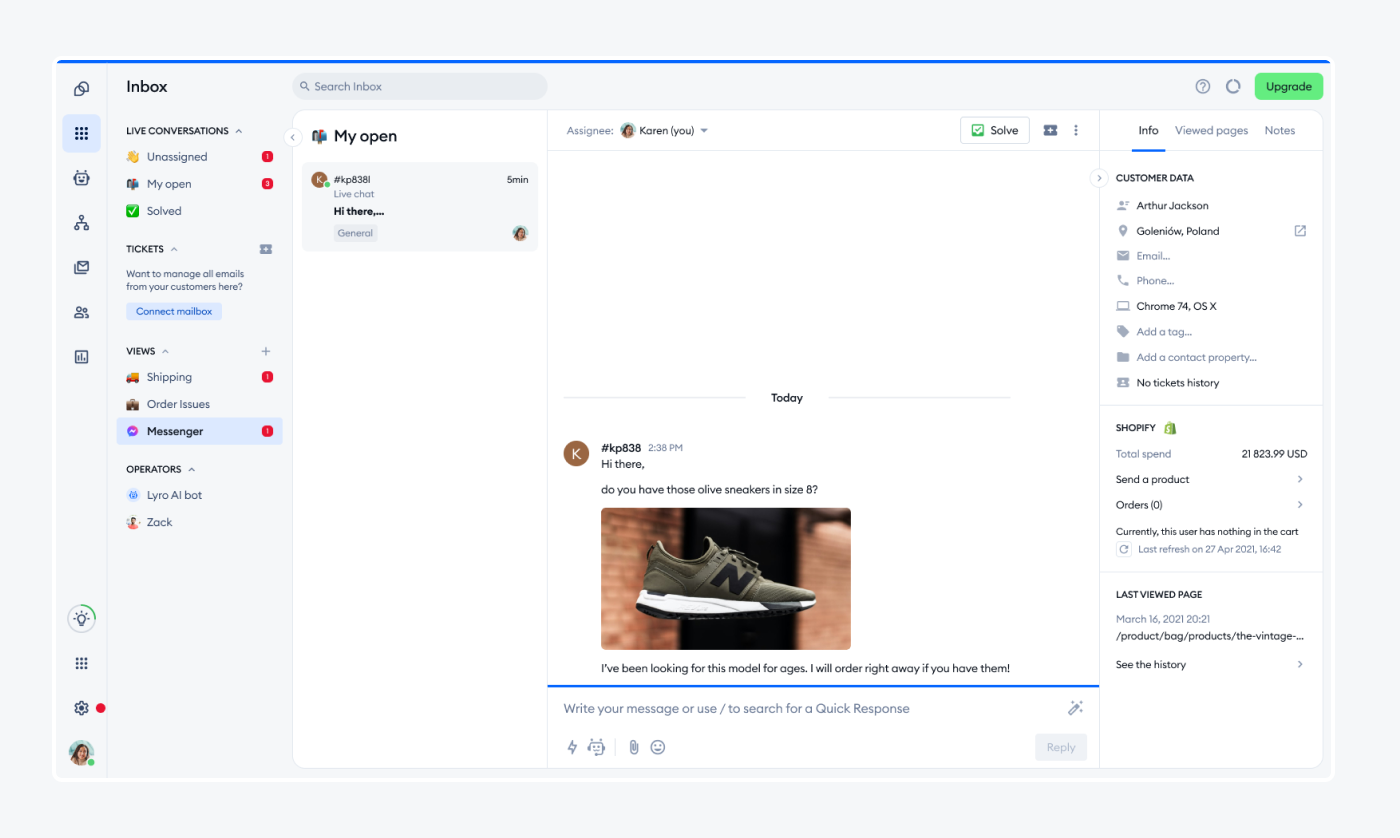
Rating: 4.7/5 ⭐️ (1,410+ reviews)
Tidio is a great omnichannel service software for small-to-medium businesses (SMBs) and ecommerce stores looking to increase retention and boost conversions. This platform delivers excellent customer service across multiple channels including live chat, social media, web forms, and more. On top of that, the dashboard has an intuitive design and you can see your team’s performance using the robust analytics feature.
Don’t believe our word for it, though—try out the software on Tidio’s free plan to find out for yourself if it’s the right fit for your business,
Main features:
- Proactive live chat feature is available
- Shared inbox for communication across multiple channels
- NLP and AI-powered chatbots
- AI help desk for easy customer segmentation
- Multiple integrations including WhatsApp, Shopify, and social media
- Mobile apps for both iOS and Android
- 7-day free trial available
- Free version available
- Starter ($29/mo)
- Growth (starts at $59/mo)
- Plus (starts at $749/mo)
- Premium (starts at $2999/mo)
Use the best omnichannel support software for your business
Read more: Check out all of Tidio’s integrations that will help you create seamless omnichannel support.
2. Sprinklr
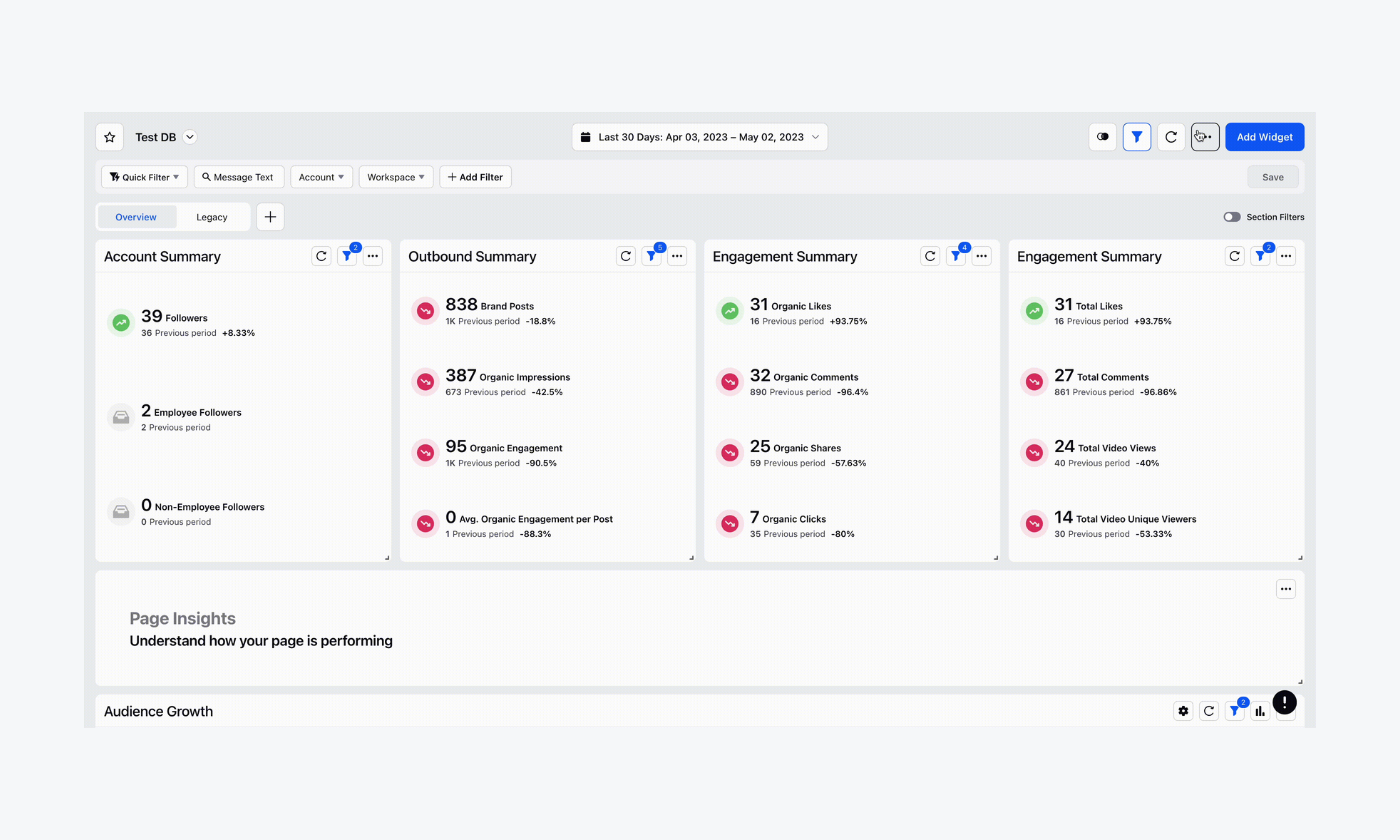
Ratings: 4.5/5 ⭐️ (404+ reviews)
Sprinklr’s omnichannel customer service platform brings together all customer interactions with your company into one platform. The helpdesk solution automates user experience by integrating email, messaging apps, and social media platforms.
The presence of a knowledge base optimizes your agents’ output. The knowledge base helps businesses run an FAQ repository and generate self-support articles. Moreover, the built-in AI compiles customer data and presents an all-around view of the user, providing informed context during engagement.
Pros:
- Easy-to-use dashboards
- Agents have 360 customer view
- AI-powered canned responses
Cons:
- The support can be slow to answer questions
- Lacks feature for live monitoring interactions
- Self-serve ($249/mo/seat)
- Enterprise → contact sales team
3. Hiver
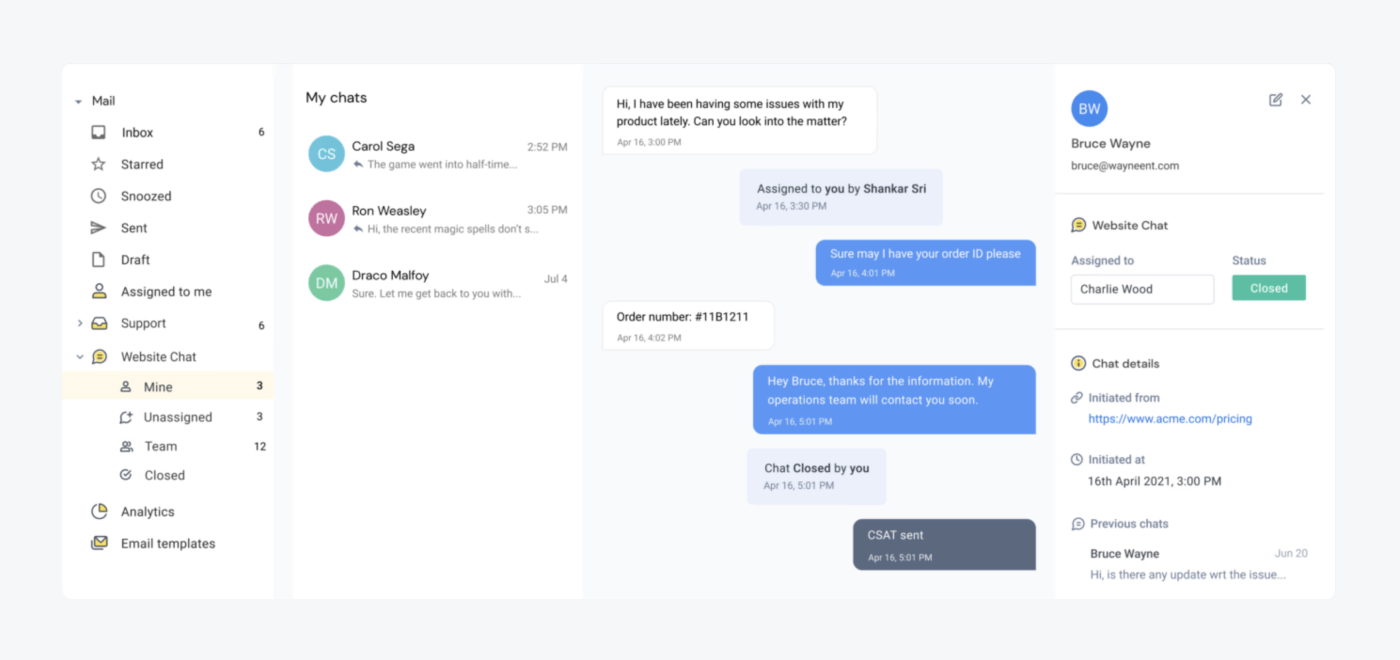
Ratings: 4.6/5 ⭐️ (1090+ reviews)
Hiver is an omnichannel communication platform that helps businesses optimize and streamline their support system. This Gmail-based software supports finance, operations, HR, and IT teams and automates some of the agents’ mundane workload.
This system gives customers seamless support across different communication channels such as live chat, email, knowledge base, and WhatsApp. The CRM centralizes data in a single platform allowing access to past tickets, interactions, and transactions.
Pros:
- Ready-to-use email templates
- Shared inbox for all customer communication
- Automation for mundane tasks
Cons:
- Limited customization of the live chat icon to match the site design
- Compatibility with platforms outside Gmail is limited
- Free 7-day trial available
- Lite ($19/mo/user)
- Pro ($59/mo/user)
- Elite ($99/mo/user)
Read more: Check out the detailed reviews of the top Hiver alternatives.
4. Zendesk
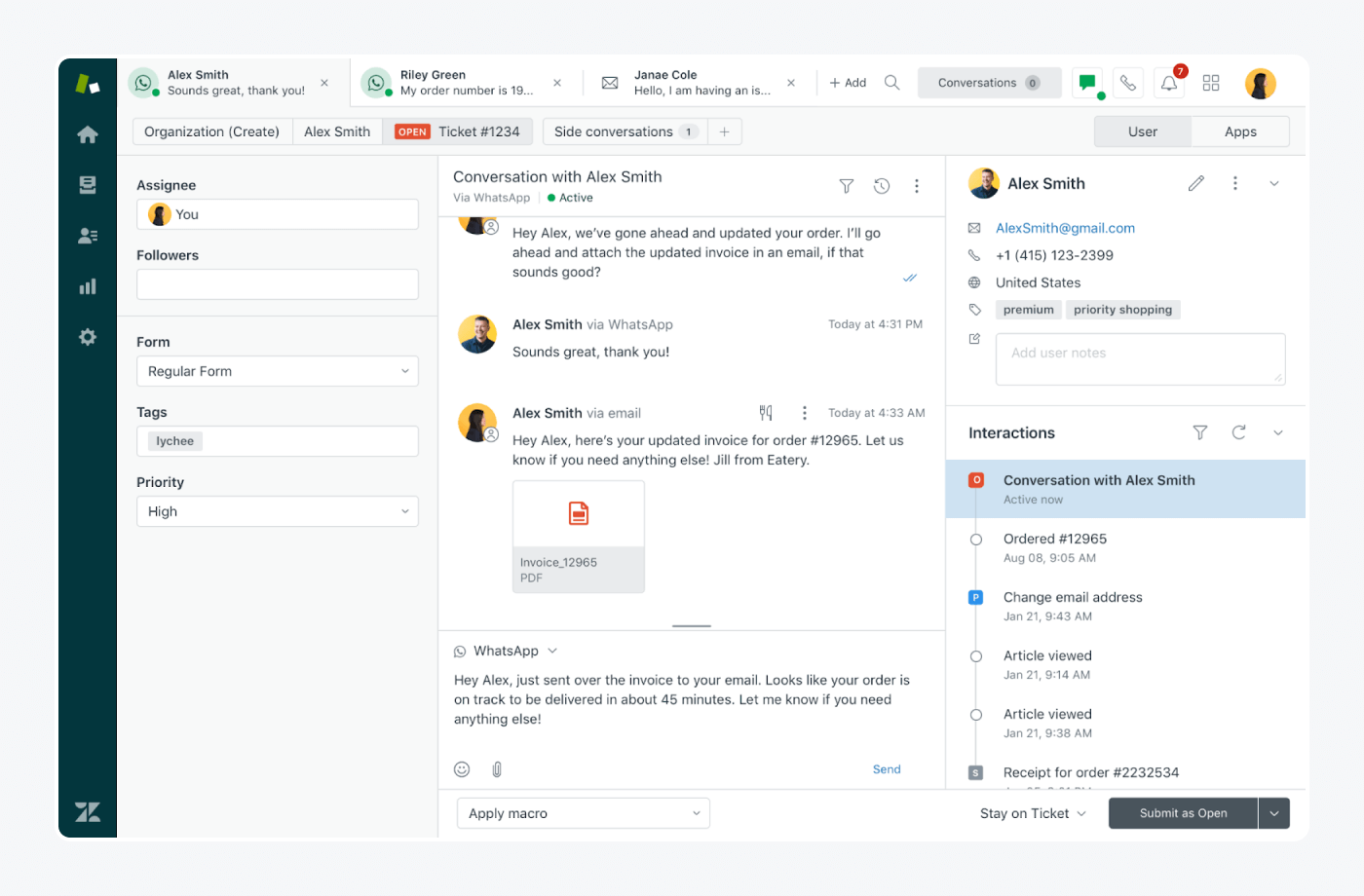
Ratings: 4.3/5 ⭐️ (5,850+ reviews)
Zendek’s omnichannel support system has self-service functionalities that deliver a clean and tailored experience for your clients. On top of that, the AI knowledge base aligns with your site and visitors can be directed to the right FAQs, saving your team the trouble of handling routine requests.
The user-friendly dashboard lets your team receive updates on what’s coming in through the phone, text messages, social media, and other channels. Zendesk helps you better understand your customers based on their user activity, allowing you to set up triggers, use canned responses, and utilize workflow steps.
Pros:
- Easy for an admin to set and configure
- Similar tickets can be merged easily
- Call script guidance that helps in consistency and quality control
Cons:
- UI requires a learning curve for first-timers
- No automated reconciliation of duplicates
- Free trial available
- Basic Plan ($19/mo/agent)
- Suite Team ($69/mo/agent)
- Suite Growth ($115/mo/agent)
- Suite Professional ($149/mo/agent)
- Suite Enterprise (Contact sales)
- Suite Enterprise Plus (Contact sales)
Read more: Explore the best Zendesk alternatives with their pricing, pros, and cons compared.
5. Happyfox
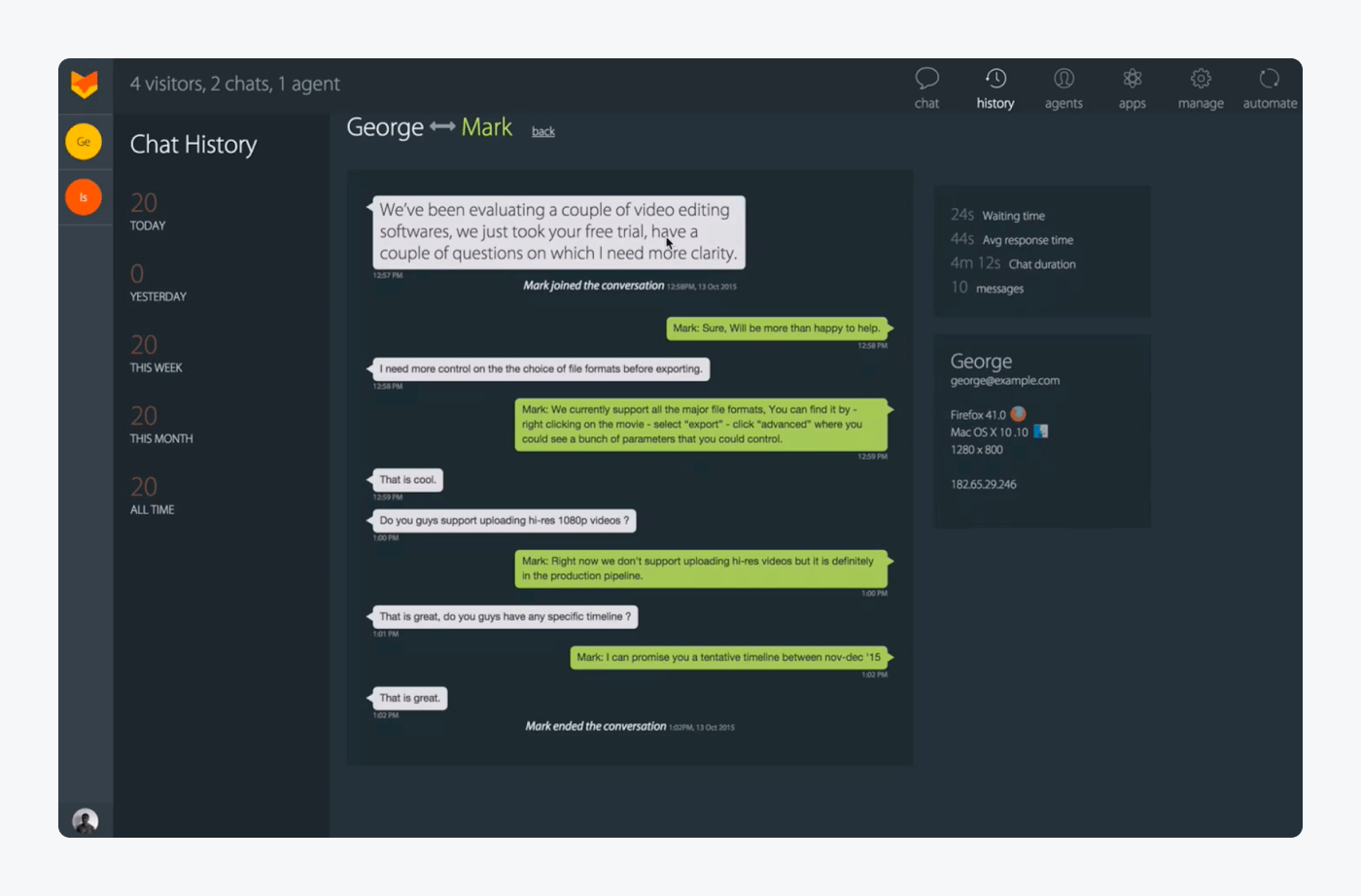
Ratings: 4.5/5 ⭐️ (125+ reviews)
Happyfox is an affordable omnichannel customer support software that helps small businesses cut costs while improving engagement and driving loyalty. Through its API functionality and web forms, Happyfox enables ticket escalation automation across multiple channels and sites.
In addition to email support and live chat, this customer service tool lets users contact you as well as your agents to engage prospects through your social media accounts. On top of that, there’s a phone call integration with Twilio and RingCentral to improve efficiency of your contact center.
Pros:
- Highly customizable software
- Multilingual client support
- Automated ticketing system
Cons:
- Delayed help desk notifications
- Service Level Agreement (SLA) inconsistencies
- Free trial account available for demo
- Mighty ($39/mo/agent)
- Fantastic ($59/mo/agent)
- Enterprise ($79/mo/agent)
- Enterprise Plus ($99/mo/agent)
Gain all the benefits an omnichannel support tool has to offer
6. HubSpot
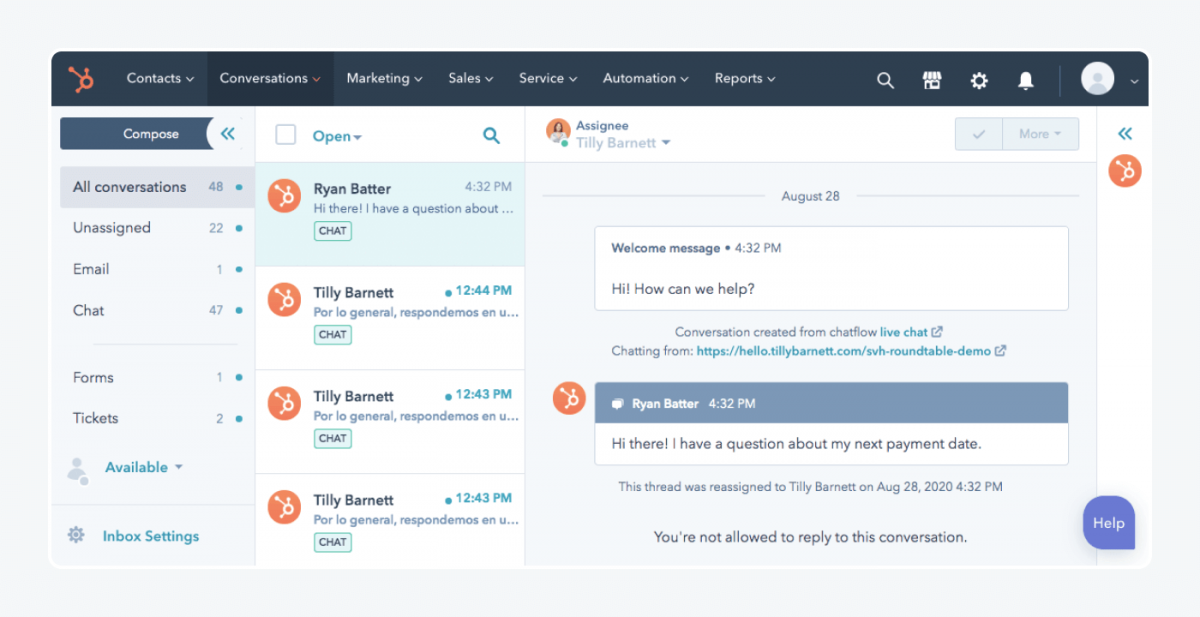
Ratings: 4.4/5 ⭐️ (10,870+ reviews)
HubSpot is one of the omnichannel customer support tools that is both powerful and accessible. It helps small and medium-sized businesses to track and manage customer relationships more effectively. Moreover, the CRM software helps to capture and track website visitors to convert them into leads.
This omnichannel support solution automatically converts customer interactions from various channels such as email, web forms, Facebook Messenger, and live chat, into tickets. A comprehensive knowledge base also helps customers with articles that answer their common questions before reaching your support reps.
Pros:
- Easy-to-use layout and interface
- Canned responses for common inquiries
- Community forums for support
Cons:
- Many tools can be confusing
- Poor customer support
- Free version available
- Starter customer platform ($20/mo/seat)
- Service Hub Professional ($100/mo/seat)
- Service Hub Enterprise (starts at $130/mo/seat)
- Professional customer platform ($1200/mo/5 seats)
- Enterprise customer platform ($4000/mo/7 seats)
Read more: Discover the top HubSpot alternatives with pros, cons, and pricing compared.
7. Intercom
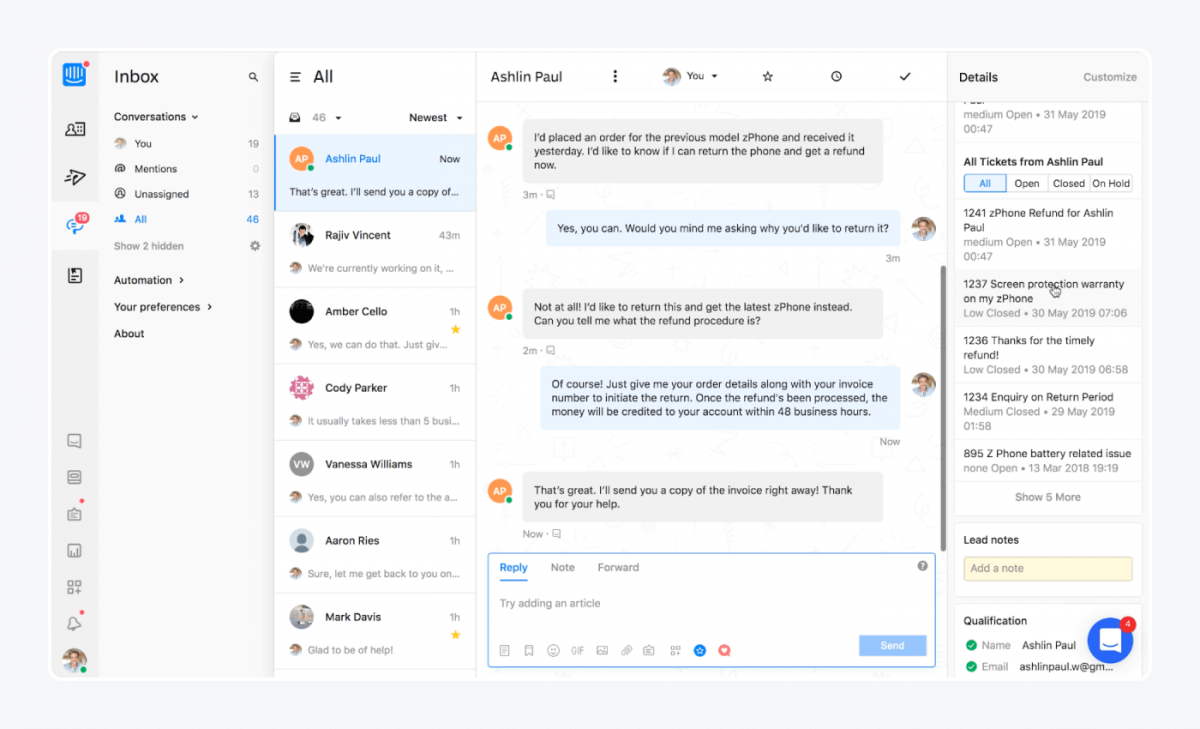
Ratings: 4.5/5 ⭐️ (2,975+ reviews)
Intercom is a versatile omnichannel ticketing system that bridges the interaction with customers from different touchpoints. This CRM software’s multichannel approach helps you stay on top of all customer updates such as emails, chats, and call center requests from one interface.
This system simplifies the customer experience using a knowledge base, automated answers to FAQs, bots, and other proactive messaging functionality. On top of that, features such as a ticket triaging, automation, and team performance reporting enhance your agent productivity.
Pros:
- Built-in AI tools and capabilities
- Powerful reporting and analytics features
- Customizable interface and chat window
Cons:
- Some features, like creating workflows, may require a learning curve
- Occasional lags and crashes when in use
- Free 14-day trial available
- Essential ($39/mo/seat)
- Advanced ($99/mo/seat)
- Expert ($139/mo/seat)
Read more: Check out the best Intercom alternatives available on the market today.
8. Freshdesk
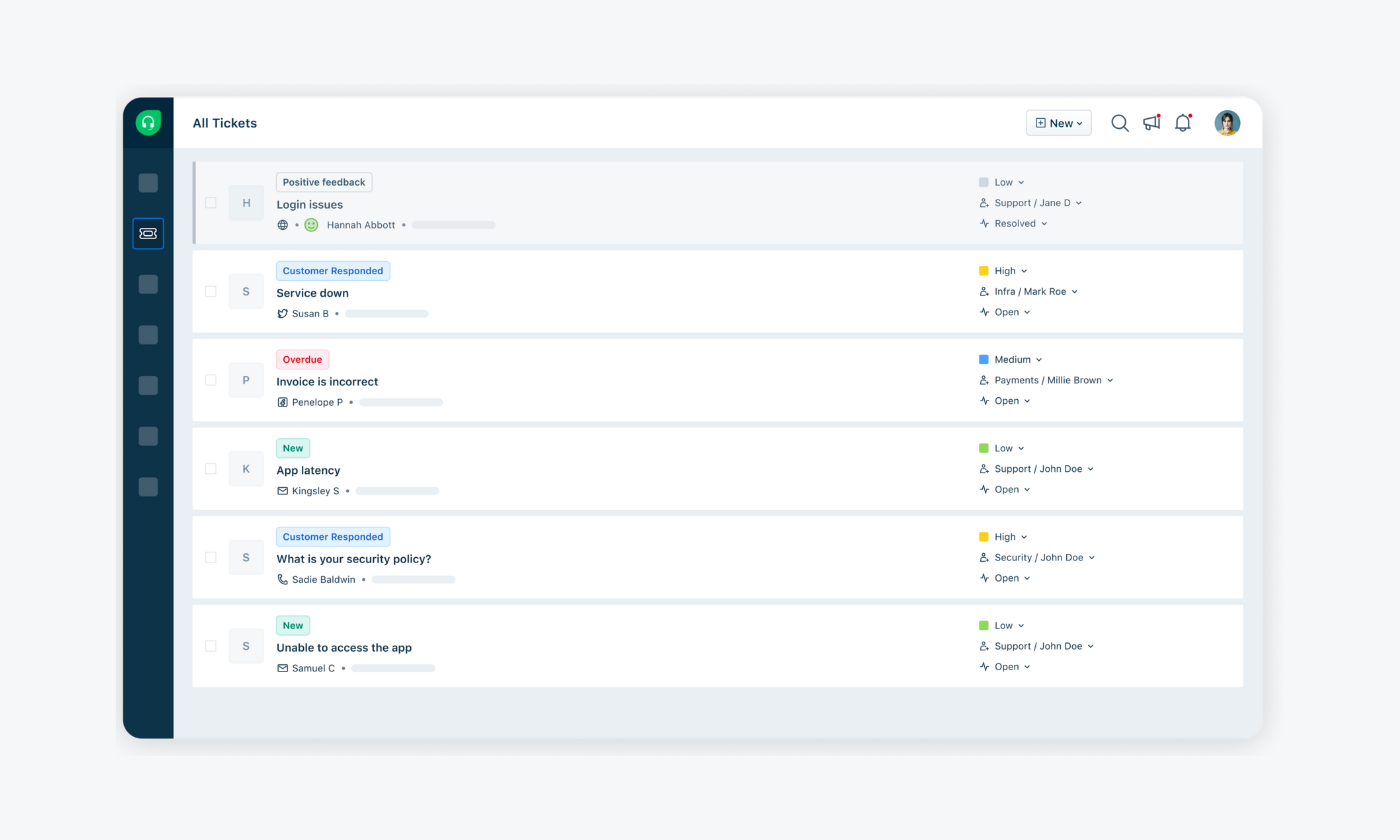
Ratings: 4.4/5 ⭐️ (10,870+ reviews)
Freshdesk is an omnichannel messaging platform that caters to businesses of all sizes by providing flexibility and centralizing communication. The dashboard helps companies monitor team performance across different engagement channels and ensure no tickets get overlooked.
As a customer support manager, you get an overview of the volume of client inquiries, customer satisfaction scores (CSAT), agent availability, and overall performance. This helps to keep track of your results and catch any issues on time.
Pros:
- Multichannel data collection in real-time and at scale
- Smart custom notifications available
- Ticket merging and assignment
Cons:
- Unsuitable for companies that receive a large number of customer service inquiries
- Only simple metrics reports available
- Free 14-day free trial
- Growth ($15/mo/agent)
- Pro ($49/mo/agent)
- Enterprise ($79/mo/agent)
Read more: Discover the top Freshdesk alternatives and pick the right one for your business.
9. Salesforce
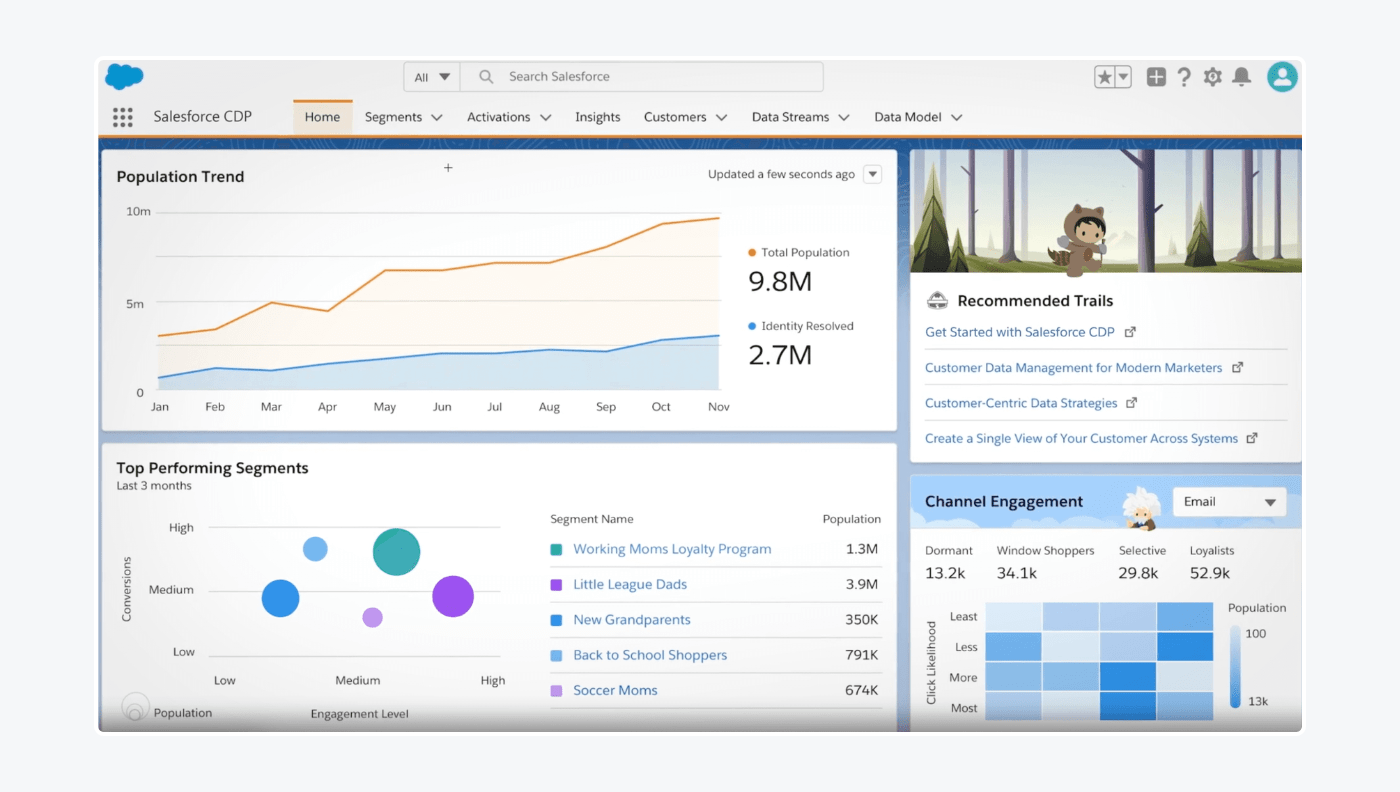
Ratings: 4.5/5 ⭐️ (1,935+ reviews)
This omnichannel customer experience software aligns communication at scale across your business. The system is enhanced by AI-powered chatbots that customize interactions based on the situation while relaying automated answers to common queries.
Through Salesforce’s unified support console, agents can engage clients on all channels from a single place. Integrations with the third-party platforms enable customer service agents to send personalized conversations driven by intelligent recommendations from CRM data.
Pros:
- Easy to customize based on the company’s needs
- Variety of integrations with third-party apps
- Strong security and privacy controls
Cons:
- Occasional errors and lag issues when in use
- Frequent security updates require further training
- Free 14-day trial
- Essentials ($25/month/user)
- Professional ($75/month/user)
- Enterprise ($150/month/user)
- Unlimited ($300/month/user)
Read more: Learn more on how chatbots for business can plug into your larger omnichannel customer strategy.
11. Zoho Desk
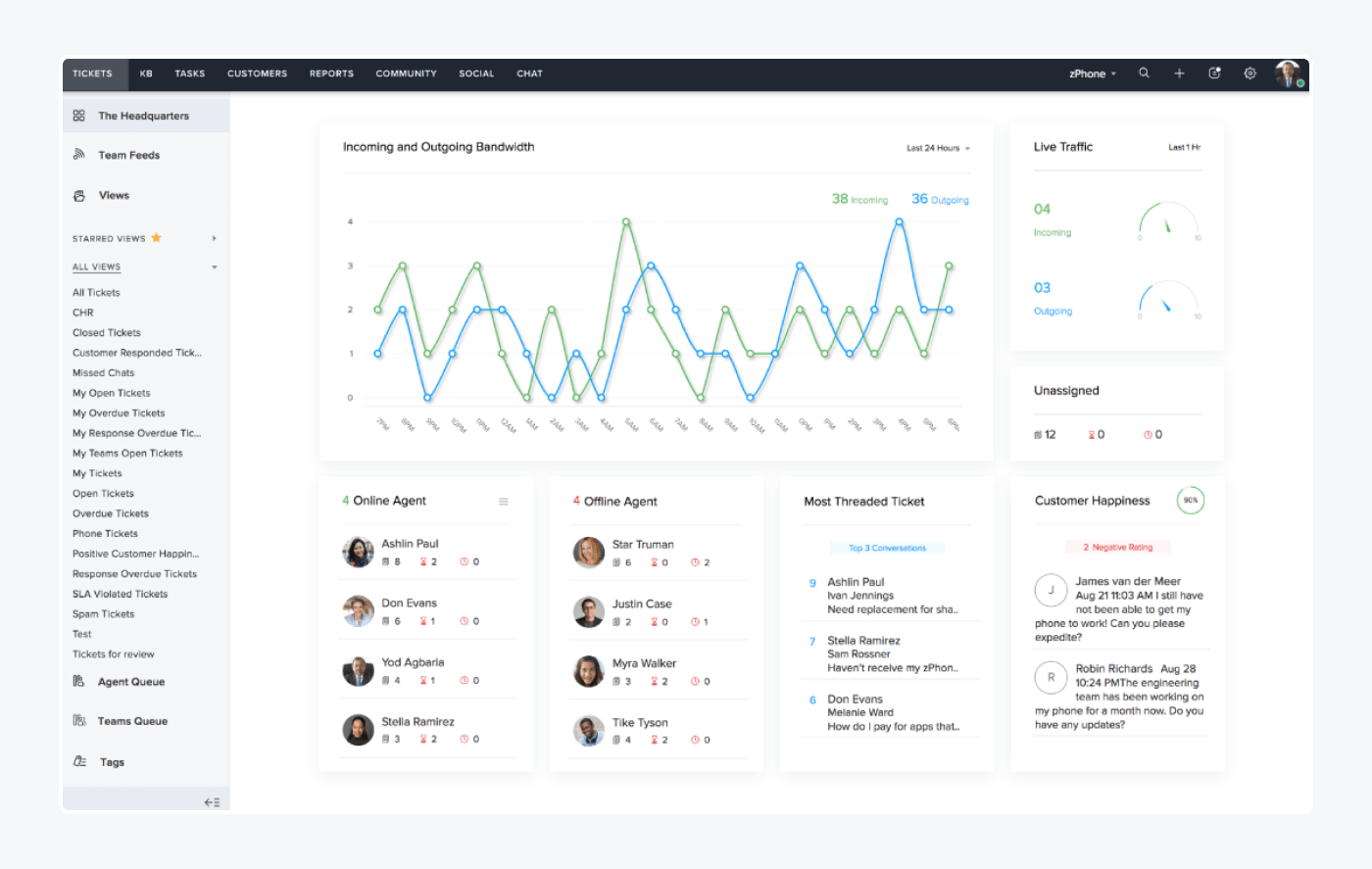
Ratings: 4.4/5 ⭐️ (5,545+ reviews)
Companies with a strong omnichannel presence record 90% higher retention rates than those that use a single channel for communicating with clients. Zoho Desk is one of the omnichannel customer support solutions that pulls all customer interactions from email, web forms, messaging platforms, and community forums into one interface.
Integrated analytics enable customer service team members to observe user behavior and engagement. On top of that, the knowledge base includes a comprehensive FAQ section to address common customer queries.
Pros:
- Simple and easy to customize
- Contextual AI available
- Shared inbox tools
Cons:
- Faulty email integration
- Some users report bugs and glitches
- Free 15-day trial available
- Standard ($20/mo/user)
- Professional ($35/mo/user)
- Enterprise ($50/mo/user)
Read more: Learn how Wulff Beltton boosted customer satisfaction using Tidio’s software.
Now that we know what the top tools are, let’s find out what advantages this approach has for your business.
Benefits of omnichannel customer service solutions
For modern-day businesses ‘content is key.’ When companies know who they are talking to and have a log of the information they have shared with a customer, issues can be resolved much faster while delivering more personalized experiences.
Here are a few more benefits of using an omnichannel customer service system:
- No agent collision—adopting an omnichannel support platform prevents multiple agents from handling a single ticket. It ensures context is maintained while client experience remains consistent. This cannot be underrated as 73% of customers consider a good online experience key in influencing brand loyalty.
- Increased customer loyalty—the system helps businesses personalize the experience boosting retention rates. This is important as a 5% increase in customer retention can increase your profitability by 25-95%.
- Lower support costs—the software can eliminate the redundancies and decrease operating expenses for the business. And research shows that companies adopting this software can slash costs by 30%.
- Streamlined customer service—support agents today rely on software systems for quick and seamless communication. This is appreciated by the visitors—in fact, about 40% of consumers have cited multiple communication options as necessary for a business’s customer service department.
- Increased conversion—businesses that communicate with clients across many different channels have a higher conversion rate as they can push the customer down the funnel on multiple occasions. It’s reported that customers who use multiple channels spend twice as much as those relying on a single channel.
Now that we have identified what the benefits are, here’s what a company should consider before opting for an omnichannel customer experience platform.
What to consider when adding an omnichannel service to your business?
Today, 9 in 10 of all communication online between customers and businesses is through messaging channels, far exceeding traditional channels like phone and email. You should start by choosing the best platform for your business and integrating all of your existing channels.
Here are some things worth considering for an effective omnichannel support:
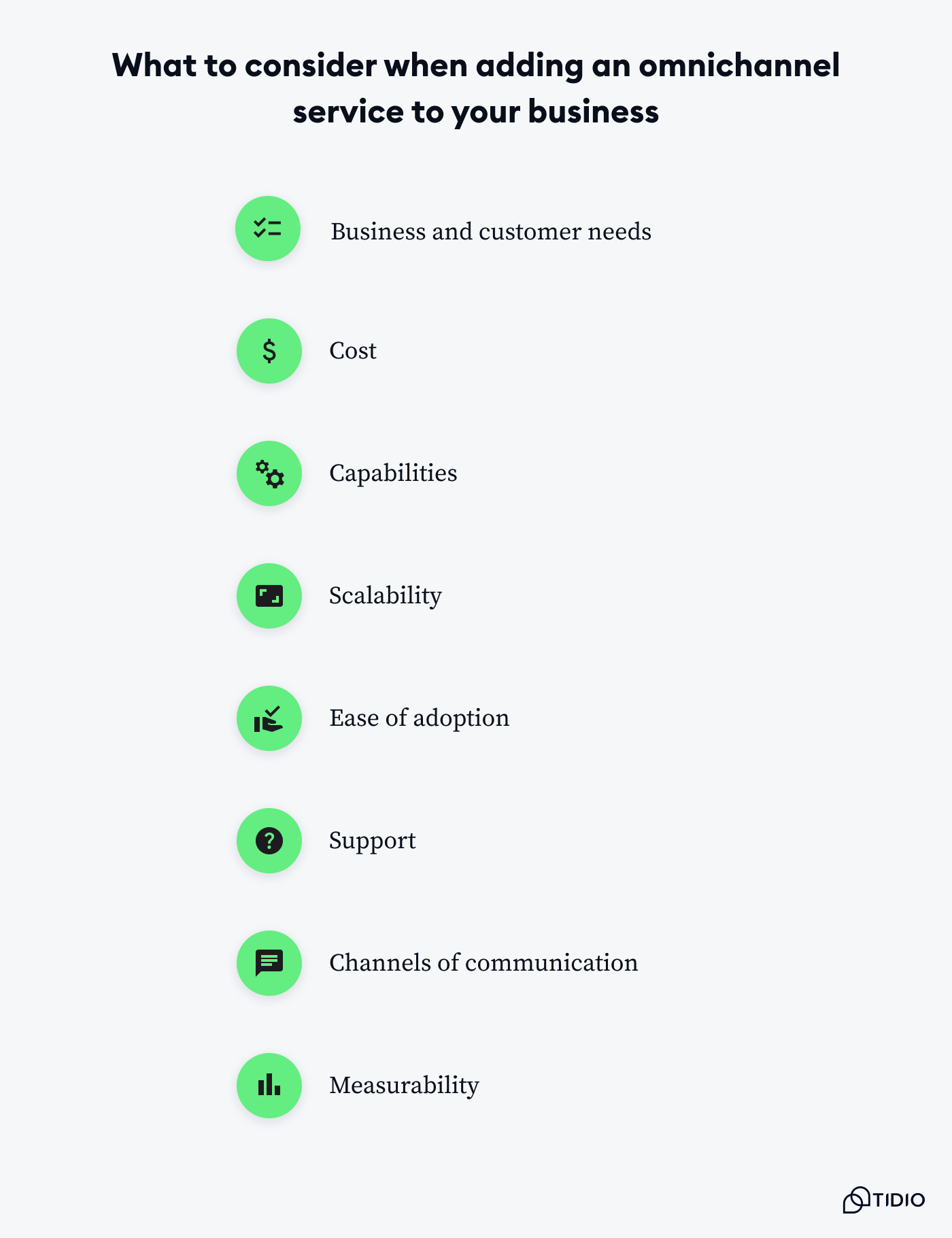
- Business and customer needs—understand how your support strategy will fit into your larger customer experience vision before singling out the software that works for you
- Cost—the benefits of having this solution should largely outweigh the cost of purchase, setup, training, and maintenance
- Capabilities—-opt for a system with AI features that will enhance and optimize your customer service operations
- Scalability—consider your company’s growth trajectory and if the chosen solution can accommodate that scale
- Ease of adoption—enable a smooth transition from the existing channels including social media, messaging channels, and your website
- Support—consider if the platform offers round-the-clock support and resources to conduct training for your entire team
- Channels of communication—ensure to first pinpoint the communication channels that your customers use the most, and then select an omnichannel software that can seamlessly integrate with them
- Measurability—you should be able to measure your performance metrics and display them on clear reporting dashboards
Read more: Check out the best AI customer support software and choose the right one for your business.
Key takeaway: omnichannel support software
A successful omnichannel strategy runs throughout a customer’s journey. At the end of the day, all the customers care about is to have their problems resolved quickly and efficiently. The core of this approach is to understand the customer’s expectations and upgrade them with the convenience of using multiple channels.
Here are the best omnichannel service tools:
- Tidio
- Sprinklr
- Hiver
- Zendesk
- Happyfox
- HubSpot
- Intercom
- Freshdesk
- Salesforce
- Zoho Desk
Omnichannel support platforms like Tidio breaks down barriers to communication with your company. Equipped with several other complementary features, you get an enriched customer service experience for both clients and support teams.
Why not try it today?
Scale your customer service with the best omnichannel support software

